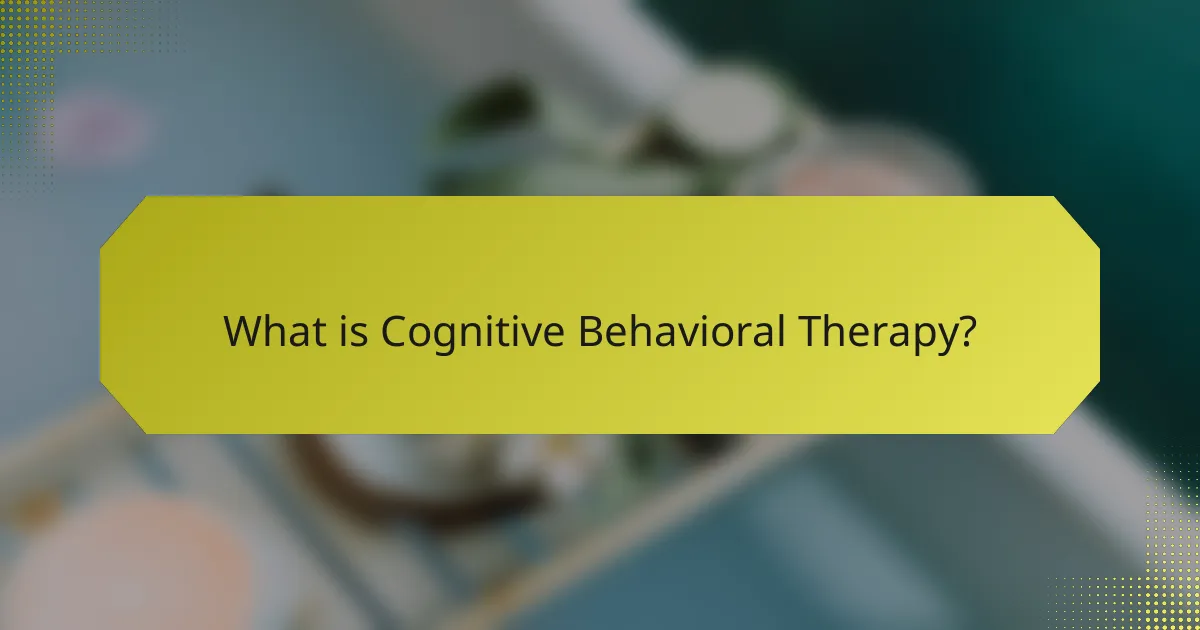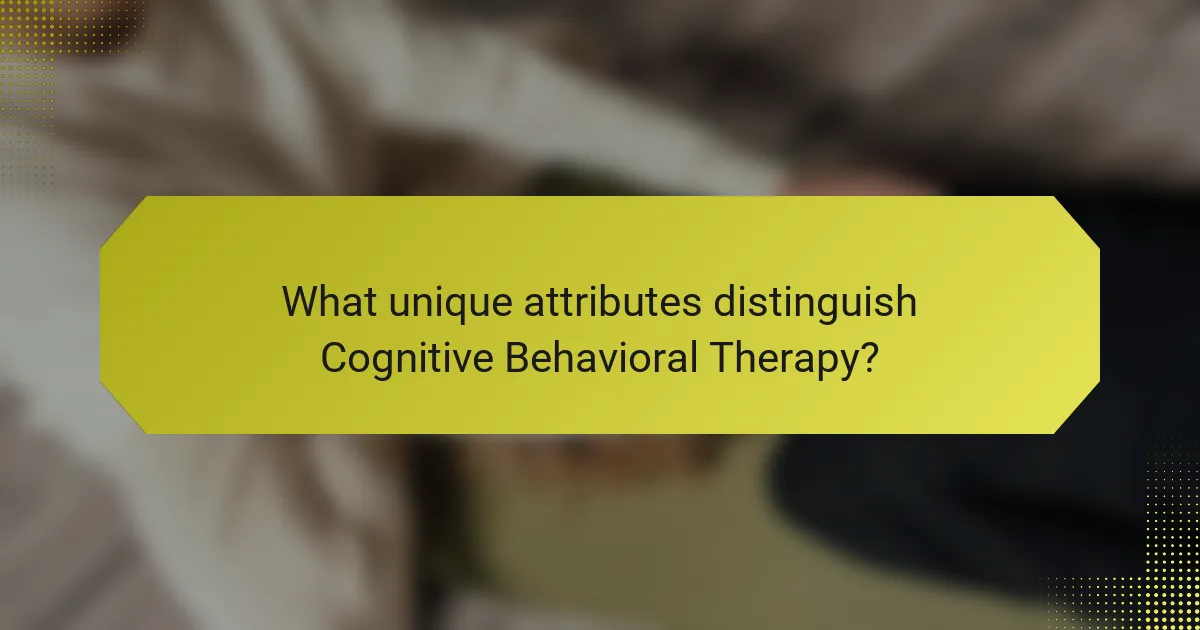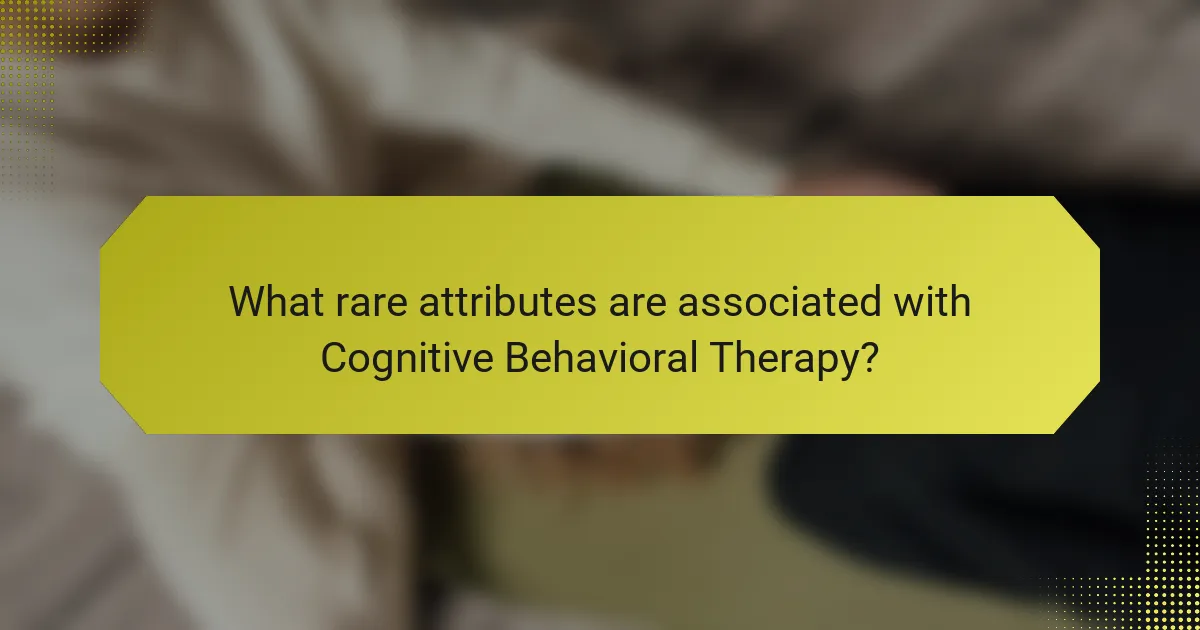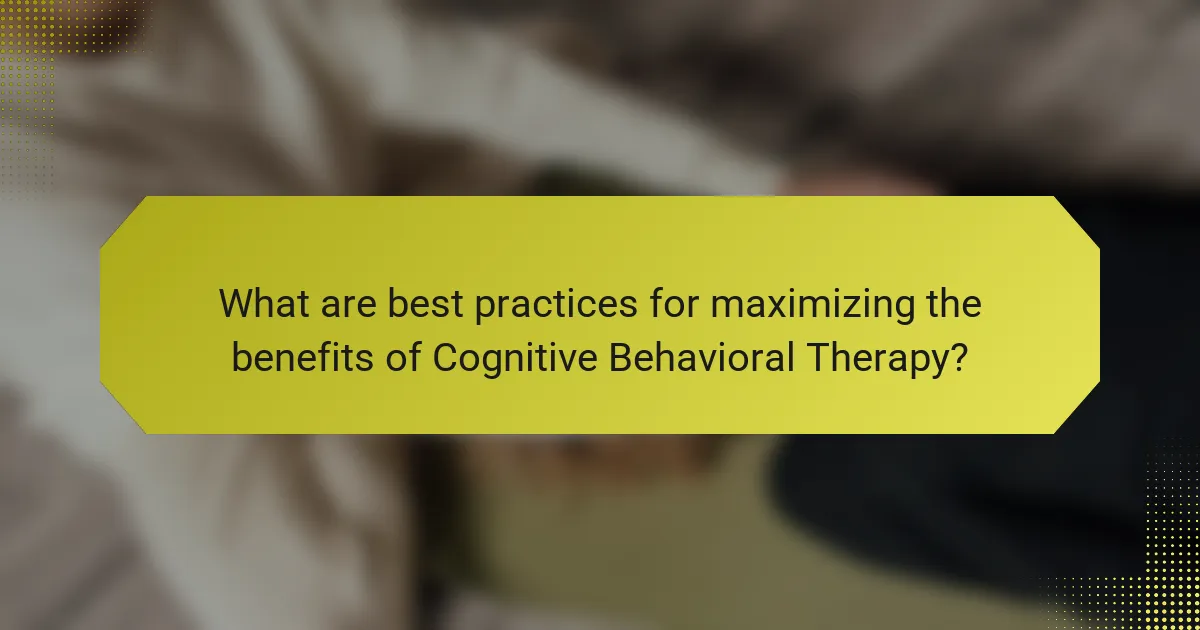Cognitive Behavioral Therapy (CBT) effectively addresses negative thought patterns and enhances mental well-being. This article explores CBT techniques, highlights its effectiveness for various mental health issues, and discusses accessibility challenges. Key strategies for maximizing CBT benefits will also be covered.

What is Cognitive Behavioral Therapy?
Cognitive Behavioral Therapy (CBT) is an effective psychological treatment that focuses on changing negative thought patterns. It employs techniques such as cognitive restructuring and behavioral activation to enhance mental well-being. Research shows that CBT significantly reduces symptoms of depression and anxiety, making it a widely accessible option. Its structured approach allows for measurable progress, appealing to individuals seeking practical solutions for emotional challenges.
How does Cognitive Behavioral Therapy work?
Cognitive Behavioral Therapy (CBT) works by identifying and changing negative thought patterns and behaviors. It combines cognitive restructuring with behavioral techniques to foster healthier thinking and coping strategies. Through structured sessions, clients learn to challenge distorted beliefs, leading to improved emotional regulation and problem-solving skills. CBT is effective for various mental health issues, including anxiety and depression, often yielding significant results within a limited timeframe.
What are the main techniques used in Cognitive Behavioral Therapy?
Cognitive Behavioral Therapy employs techniques such as cognitive restructuring, exposure therapy, and behavioral activation. These methods help individuals identify and change negative thought patterns, confront fears, and engage in positive activities. Cognitive restructuring focuses on challenging distorted beliefs, while exposure therapy gradually exposes clients to feared situations. Behavioral activation encourages participation in enjoyable activities to improve mood. These techniques enhance the effectiveness of therapy by fostering positive behavioral changes and emotional well-being.
What is cognitive restructuring?
Cognitive restructuring is a core technique in cognitive behavioral therapy that helps individuals identify and change negative thought patterns. By challenging irrational beliefs, this approach improves emotional responses and promotes healthier thinking. Research shows that cognitive restructuring effectively reduces symptoms of anxiety and depression, making it a valuable tool in mental health treatment. Its accessibility through various therapy formats enhances its impact on diverse populations.
How does exposure therapy function?
Exposure therapy helps individuals confront fears gradually, reducing anxiety over time. It functions through systematic desensitization, where patients are exposed to their fears in a controlled environment. This technique is rooted in cognitive behavioral therapy principles, promoting coping strategies and altering negative thought patterns. Studies show that exposure therapy can significantly decrease symptoms of anxiety disorders, making it an effective treatment option. Accessibility varies, with options available through licensed therapists or digital platforms.
What role do behavioral experiments play?
Behavioral experiments are essential in Cognitive Behavioral Therapy (CBT) as they help clients test and challenge their beliefs. These experiments provide practical evidence to counter negative thought patterns, enhancing self-awareness and promoting cognitive restructuring. By engaging in real-life scenarios, clients can observe the outcomes of their behaviors, leading to a deeper understanding of the relationship between thoughts, feelings, and actions. This experiential learning fosters resilience and empowers individuals to adopt healthier coping strategies, ultimately improving therapy effectiveness.

What are the universal benefits of Cognitive Behavioral Therapy?
Cognitive Behavioral Therapy (CBT) offers universal benefits such as improved emotional regulation, enhanced coping strategies, and reduced symptoms of anxiety and depression. These benefits stem from CBT’s structured approach, which empowers individuals to identify and challenge negative thought patterns. Research shows that CBT is effective for a wide range of mental health issues, making it accessible for diverse populations. Its techniques can be adapted for various settings, including individual therapy, group sessions, and online platforms, increasing its reach and effectiveness.
How effective is Cognitive Behavioral Therapy for anxiety disorders?
Cognitive Behavioral Therapy (CBT) is highly effective for anxiety disorders. Research indicates that CBT reduces anxiety symptoms in approximately 60-80% of patients. Techniques such as cognitive restructuring and exposure therapy empower individuals to manage anxiety triggers. Accessibility has improved with online platforms, making CBT more available to diverse populations.
What impact does Cognitive Behavioral Therapy have on depression?
Cognitive Behavioral Therapy (CBT) significantly reduces symptoms of depression. Research shows that CBT can improve mood and coping strategies, leading to long-term benefits for individuals. The structured approach of CBT helps patients identify and change negative thought patterns, promoting healthier behaviors. Studies indicate that about 60-80% of patients experience improvement in their depressive symptoms after completing a CBT program. Additionally, CBT is accessible through various platforms, including in-person sessions and online therapy, making it a versatile option for many seeking help.
How does it support stress management?
Cognitive Behavioral Therapy (CBT) effectively supports stress management by identifying and altering negative thought patterns. This approach enhances emotional regulation, promotes coping strategies, and reduces anxiety. CBT’s structured techniques, such as exposure therapy and cognitive restructuring, empower individuals to confront stressors and develop resilience. Studies show that CBT can significantly lower stress levels, improving overall mental health and well-being.

What unique attributes distinguish Cognitive Behavioral Therapy?
Cognitive Behavioral Therapy (CBT) is distinguished by its structured approach, focus on present issues, and evidence-based techniques. Unique attributes include the emphasis on identifying cognitive distortions, the integration of behavioral interventions, and the goal-oriented nature of treatment. These aspects enhance its effectiveness for various mental health conditions.
How is Cognitive Behavioral Therapy tailored for children and adolescents?
Cognitive Behavioral Therapy (CBT) for children and adolescents is customized to their developmental stages and individual needs. Techniques include play therapy, role-playing, and art activities, making the process engaging and relatable. CBT effectively addresses anxiety, depression, and behavioral issues in youth, with studies showing significant improvement in symptoms. Accessibility is enhanced through school-based programs and online resources, ensuring broader reach for young individuals.
What are the differences between traditional therapy and Cognitive Behavioral Therapy?
Cognitive Behavioral Therapy (CBT) focuses on changing negative thought patterns, while traditional therapy often explores past experiences. CBT is structured and goal-oriented, typically shorter in duration. Traditional therapy may delve into emotional processing and long-term issues, leading to varied session lengths. CBT’s effectiveness is supported by extensive research, showing significant improvements in mental health conditions. Accessibility varies, with CBT often available through online platforms, making it more convenient for many individuals.

What rare attributes are associated with Cognitive Behavioral Therapy?
Cognitive Behavioral Therapy (CBT) has several rare attributes that enhance its effectiveness. These include personalized treatment plans that adapt to individual cognitive patterns, integration of mindfulness techniques, and the use of technology for remote therapy sessions. Additionally, some practitioners employ neurofeedback as an adjunct to traditional CBT, which is not commonly found in standard practices.
How does Cognitive Behavioral Therapy address complex trauma?
Cognitive Behavioral Therapy effectively addresses complex trauma by focusing on the relationship between thoughts, emotions, and behaviors. It employs techniques such as cognitive restructuring, exposure therapy, and skills training to help individuals process traumatic experiences. These methods promote emotional regulation and reduce symptoms of anxiety and depression associated with trauma. Research indicates that CBT significantly improves the quality of life for trauma survivors, making it a widely accessible treatment option.
What are the innovative adaptations of Cognitive Behavioral Therapy in technology?
Cognitive Behavioral Therapy (CBT) has adapted through technology to enhance its effectiveness and accessibility. Digital platforms enable remote therapy sessions, allowing broader access for individuals. Mobile applications offer self-guided CBT techniques, facilitating practice outside traditional settings. Virtual reality is emerging as a unique tool for exposure therapy, immersing users in controlled environments. These innovations make CBT more engaging and tailored to individual needs.

What are the accessibility challenges for Cognitive Behavioral Therapy?
Cognitive Behavioral Therapy faces several accessibility challenges. These include limited availability of trained therapists, high costs of sessions, and geographical barriers that restrict access for individuals in remote areas. Additionally, stigma surrounding mental health can deter individuals from seeking help. Language and cultural differences may also hinder effective communication and understanding of therapy concepts.
How can individuals find affordable Cognitive Behavioral Therapy options?
Individuals can find affordable Cognitive Behavioral Therapy options by exploring community mental health centers, sliding scale therapists, and online platforms. Many therapists offer reduced fees based on income, making therapy more accessible. Additionally, some universities provide low-cost services through training clinics. Online therapy platforms often have subscription models that can be more affordable than traditional in-person sessions. Researching local resources and utilizing teletherapy options can significantly reduce costs while ensuring effective treatment.
What role do online platforms play in enhancing accessibility?
Online platforms significantly enhance accessibility to Cognitive Behavioral Therapy (CBT) by providing flexible options for users. They offer remote therapy sessions, which eliminate geographical barriers and reduce wait times. Additionally, many platforms feature resources like self-help materials and interactive tools, making CBT more approachable. The unique attribute of anonymity in online therapy can also encourage individuals to seek help who may feel uncomfortable in traditional settings. As a result, these platforms play a crucial role in increasing the reach and effectiveness of CBT for diverse populations.

What are best practices for maximizing the benefits of Cognitive Behavioral Therapy?
To maximize the benefits of Cognitive Behavioral Therapy (CBT), practice regularly, engage actively, and maintain open communication with your therapist. Consistency in applying techniques enhances effectiveness.
1. Set clear goals to track progress.
2. Practice cognitive restructuring daily to challenge negative thoughts.
3. Utilize behavioral experiments to test beliefs.
4. Engage in mindfulness to increase self-awareness.
5. Keep a journal to reflect on experiences and emotions.
6. Seek feedback from your therapist for continuous improvement.
What common mistakes should be avoided during therapy?
Avoiding common mistakes during Cognitive Behavioral Therapy (CBT) enhances its effectiveness. Key mistakes include not setting clear goals, failing to engage in homework assignments, and neglecting to communicate openly with the therapist. Additionally, skipping sessions or being inconsistent can hinder progress. Lastly, misunderstanding CBT principles may lead to unrealistic expectations about outcomes. Addressing these issues can improve therapy outcomes significantly.
How can clients actively participate in their Cognitive Behavioral Therapy sessions?
Clients can actively participate in their Cognitive Behavioral Therapy sessions by engaging in open communication, setting personal goals, and practicing techniques outside of sessions. They should express their thoughts and feelings honestly to foster a collaborative environment. Setting specific, measurable goals enhances focus and motivation. Additionally, applying learned strategies, such as cognitive restructuring or behavioral experiments, in daily life reinforces the therapeutic process. This active involvement increases the effectiveness of therapy and promotes lasting change.
What tips can improve the effectiveness of Cognitive Behavioral Therapy?
To improve the effectiveness of Cognitive Behavioral Therapy (CBT), consider these strategies. Establish clear goals for therapy sessions to focus efforts. Engage in regular practice of CBT techniques outside sessions, such as journaling or thought records. Maintain open communication with the therapist about challenges and progress. Incorporate mindfulness practices to enhance emotional regulation. Lastly, ensure a supportive environment by involving family or friends in the therapeutic process.


